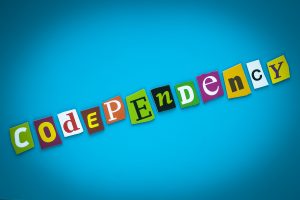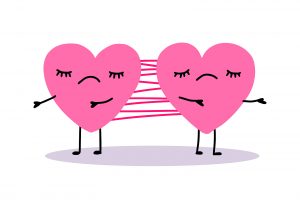You’ve been hearing this phrase everywhere now: “codependent”
Maybe someone has even said they are concerned that you are codependent. Or, you’ve recently ended a relationship and wonder if it was codependent. Whatever brought you here, I’m so glad you found this!

Let’s start with a story…
I have this colleague (she knows who she is, don’t worry) who just left a 10-year marriage. She doesn’t know how to be by herself! Between a string of “serial monogamy” dating relationships in college and the realities of her marriage and kiddos, it just wasn’t a thing she had to think about. There were always people there. Always a companion. Always someone to please and feel pleased about pleasing. Does the phrase “people-pleaser” come to mind?!? I hope so. Now, she’s feeling a little lost. Of course, there are a million different things that could be going on. Trauma. Grief. Loss. Identity questions. All of those major life transitions and the emotions that go with them. But, it would also be worth considering if perhaps she is dealing with codependency.
What is codependency anyway?
Well, I have a whole page dedicated to what this looks like in therapy. But, here are some of the hallmarks of codependency. The core of codependence is losing your sense of self. A person who is truly codependent finds that almost all of their thoughts and behaviors revolve around another person. Or, this could be an entire set of people in their life. Friends, family members, coworkers, anyone who you have a close and consistent relationship with. For any amount of time.
What is codependency NOT?
 Sometimes, people get “codependent” confused with other, far more normal ways of being with others. If you found this article, you may still be on the fence about what’s going on in your world. Totally understandable! Let’s try a few more examples to help define the difference. Some healthy ways of caring for others that often get confused with codependency are:
Sometimes, people get “codependent” confused with other, far more normal ways of being with others. If you found this article, you may still be on the fence about what’s going on in your world. Totally understandable! Let’s try a few more examples to help define the difference. Some healthy ways of caring for others that often get confused with codependency are:
- Feeling comforted by the presence of another person
- A desire to help a struggling friend or family member
- Even making an occasional sacrifice to help someone you love
- Not wanting your loved one to leave
People also sometimes use the term “codependent” to describe behaviors that are actually “clingy” or otherwise unhealthy. Of course, that leads to some confusion too. One way to think of codependency is “extreme support” where you end up losing yourself in the process. This is very different from feeling connected to or even “clingy” with another person.
So, what does this mean?
Basically, it means that lots of people have some tendency to be co-dependent. Especially women. We’re wired for connection. And, as young girls, socialized to be as selfless as possible. Now, how do you know the difference? Are there more ways to know if the issue you’re having is simply socialization or codependency? Sure. There are quizzes, books, and worksheets to try to figure out whether or not you are actually codependent. But, I’ve narrowed this down a bit based on my therapy work with women, teens, and moms in Florida who deal with codependency.
11 Signs You Might Be Codependent:
 Constant people-pleasing
Constant people-pleasing- Always helping others at the expense of yourself
- Frequently feeling guilty or ashamed without a true reason
- Having difficulty being assertive
- Struggling to set boundaries and/or actually stick to the boundaries you’ve set
- Having poor communication skills
- Being very self-critical more often than not
- Overly focused on “fixing” situations/people
- Many perfectionist tendencies, especially with relationships
- Constantly needing the approval of others
- Having control issues, or a need to control people and situations around you
If you are concerned about this, you probably have a reason to be. Maybe, you want to more fully understand how codependency affects your life. Or, you simply want to learn more. Either way, visit my codependency page and read all about it. The good news is, you can find healing, learn to be with yourself again and, well, find you even if you’ve been struggling with codependency for years. If you’re ready to talk about it, let’s connect!
Begin Codependency Counseling for Women in Miramar, FL or Start Online Therapy in Florida
If you are looking for a therapist who specializes in helping women, look no further. Enid is here to support your mental health journey. To begin therapy for women in Broward County in-person or for online therapy in Florida, follow these three steps:
-
Contact Counseling Solutions of Boward to schedule your free 20-minute consultation on a video platform,
-
Meet with Enid and get to know her!
-
Live life with more security and confidence as a fully whole, beautiful human.
Other Therapy Services Offered at Counseling Solutions of Broward:
In addition to providing codependency treatment for women in Florida, Enid De Jesus offers a variety of mental health services at her counseling clinic in Broward County, FL. Her goal is to create lasting transformative change and growth in your life. So, she offers anxiety treatment, depression treatment, counseling for imposter syndrome, after divorce counseling, and relationship counseling for one. For more information on counseling, please check out her what to expect page or contact her counseling office.

Leave a Reply